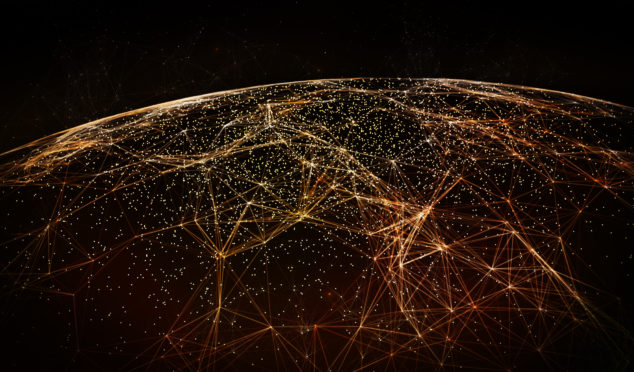MEF’s Riccardo Amati shares his take on the week’s mobile and tech stories from around the world. Headlines include… From AI Translation to eSIM: Apple Doubles Down on Platform Lock-In, Regulatory Misfire Leaves Americans Paying More for Mobile, Musk Eyes Starlink-to-Phone Connectivity and much more… Alternatively listen On MEF Radio.

From AI Translation to eSIM: Apple Doubles Down on Platform Lock-In
Apple has unveiled its iPhone 17 lineup along with a slimmer iPhone Air, keeping prices mostly steady despite tariffs and supply-chain pressures. The upgrades—thinner designs, the new A19 chip, and expanded storage—are modest, but the bigger goal is strengthening Apple’s ecosystem.
By pairing higher-priced iPhones with updated AirPods Pro 3 and Apple Watches, and adding features like real-time AI translation, on-device generative AI, and virtual eSIM support, Apple is encouraging consumers to stay fully within its platform.
The company is also introducing a $2,000 iPhone 17 Pro Max with two-terabyte storage, signaling a push to get buyers used to ultra-premium prices. Entry-level iPhones remain around $1,099, but tariffs, production costs, and upcoming foldable models may push prices higher.
Analysts say Apple’s strategy, from multi-device integration to premium pricing, is setting the stage for future iPhones to reset the price standard, keeping consumers deeply tied to its hardware and services ecosystem.

Regulatory Misfire Leaves Americans Paying More for Mobile
EchoStar’s sale of wireless spectrum to AT&T and SpaceX has effectively ended the promise of a competitive four-player U.S. mobile market, according to Bloomberg.
The move, originally meant to create a viable fourth carrier after T-Mobile’s Sprint merger, has left U.S. consumers paying some of the world’s highest wireless bills—3.5 times higher than markets with four competitors, the news agency notes.
EchoStar, now consolidated under Charlie Ergen, struggled to roll out service and meet obligations, while regulators failed to enforce the original plan.
Analysts warn the sale strengthens the Big Three—Verizon, AT&T, T-Mobile—limiting choice and raising prices, and mobile virtual network operators like Boost face dependence on carriers’ towers. U.S. wireless users are now left paying the price of a regulatory misfire.

Musk Eyes Starlink-to-Phone Connectivity
Elon Musk has outlined SpaceX’s plan to use spectrum acquired from EchoStar to deliver high-bandwidth connectivity directly from Starlink satellites to phones. Speaking on the All-In Podcast, Musk said current phones would need modified chipsets to support the new frequencies, with compatible devices expected in about two years.
The goal is for Starlink satellites and phones to “handshake” for seamless video streaming anywhere, giving SpaceX an edge over competitors like AST SpaceMobile, Apple/Globalstar, and Lynk Global. Musk emphasized the service isn’t intended to put existing mobile operators out of business, though he hinted at potential future moves to expand spectrum access.
Industry experts remain cautious. AT&T CEO John Stankey questioned whether SpaceX could fully bypass carriers, citing spectrum limits and the need for ground infrastructure. Analysts say a mobile virtual network operator partnership will likely be essential for SpaceX to deliver Starlink phones directly to consumers.

EU Explores Age Verification for Mobile Platforms
The European Commission will explore possible restrictions on social media use for children under 16, following similar rules set to take effect in Australia in December.
President Ursula von der Leyen said she will convene a panel to advise on policies to make platforms safer for young users, aiming to have recommendations by year-end.
The move reflects growing global pressure to implement age checks and limit children’s exposure to harmful content online.
France, Spain, and Greece are pushing for EU-wide mandatory age restrictions, while Australia’s policy will apply to platforms like Facebook, Instagram, TikTok, X, and YouTube. Tech companies have expressed concern about reliably verifying age, though government trials suggest it is feasible.

OpenAI Builds AI Jobs Platform to Rival LinkedIn
OpenAI is building an AI-powered jobs platform that could rival LinkedIn, aiming to match workers with employers using advanced AI tools.
The move comes as AI reshapes the workforce and expands beyond chatbots into practical applications.
OpenAI says the platform will help people gain AI skills, connecting them to companies in need, with certifications available through its OpenAI Academy. Walmart and John Deere are among early partners. The company is also supporting US efforts to boost AI literacy nationwide.
For mobile devices, this could mean smarter recruitment apps and AI-assisted job searches built directly into smartphones and enterprise platforms. Users could see personalized job matches and certification tracking right on their devices.

Oracle Shares Soar as AI Drives Cloud Surge
Oracle shares jumped in a record rally this week, after unveiling a bullish cloud outlook. Bookings, measured as remaining performance obligations, hit $455 billion, more than quadruple last year.
AI is the engine: Oracle signed a 4.5 gigawatt data center commitment with OpenAI, enough to power millions of homes, and struck multibillion-dollar deals with Nvidia and TikTok.
Cloud infrastructure revenue grew 55% to $3.3 billion last quarter, with CEO Safra Catz projecting that unit to expand from $18 billion this fiscal year to $144 billion by 2030.
For the mobile ecosystem, these numbers matter: apps from TikTok to future AI-driven mobile assistants will increasingly run on Oracle’s infrastructure.
The scale of Oracle’s $35 billion annual capex signals just how much mobile AI services will depend on hyperscale cloud.
Bottom line: Oracle is quietly cementing itself as a core supplier for the mobile-first, AI-powered internet.

Oracle Bets Big on AI Inference for Mobile Services
The company is now betting heavily on AI inference—running trained models to generate content—arguing that this will be the fastest-growing workload for businesses and governments.
And inference is where consumer-facing services live: personalized recommendations, on-device AI assistants, and app-level automation.
Oracle’s strength lies in its control of enterprise data, which could allow it to bridge business workflows with mobile services.
Chairman Larry Ellison says Oracle’s new AI database will let companies query private data directly, feeding into AI agents that can power everything from customer apps to connected devices.

Ellison Rides the AI Wave to Mobile Power
Larry Ellison is back in the spotlight, riding the AI boom like a tech tidal wave.
Oracle’s AI contracts have skyrocketed from $138 billion to $455 billion in three months.
Ellison, once slow to embrace cloud, is now steering Oracle to the front of the AI infrastructure race, supplying the computing power behind the apps driving the next mobile ecosystem.
Shares jumped 36 percent, briefly making him the world’s richest person again.
The scale is massive, but success depends on Oracle delivering the hardware and its AI partners paying up.
One line to remember: Larry Ellison missed cloud, but he’s making AI his comeback crown.

Ant’s Humanoids Aim to Power Chatbots and Assistants
Jack Ma-backed Ant Group has unveiled its first humanoid robot, the R1, as it ramps up its push into AI-powered machines. The robot can act as a tour guide, sort medicine, provide medical consultation, and perform basic kitchen tasks.
Unlike other robotics firms, Ant is focusing on the AI “brains” behind the machines, aiming to make humanoids a gateway for its chatbots and assistants.
The R1, built with Chinese-made parts and tested in restaurants and community care centers, uses Ant’s cloud-based AI to plan and execute complex tasks—from preparing meals to learning new recipes.
CEO Zhu Xing says the goal is to make everyday life easier, whether in finance, healthcare, or household chores.
Ant hasn’t released a price and isn’t selling to consumers yet, but the move signals China’s growing ambition in commercial humanoids, where Tesla and local rival Unitree are also competing.

Russian-Origin Nebius Powers Microsoft’s ChatGPT Surge
At the beginning of the week, Microsoft has struck a multiyear deal with Nebius, a cloud computing company spun out of Russia’s Yandex, to secure AI computing power worth up to 19.4 billion dollars through 2031.
Nebius will provide dedicated capacity from a new data center in New Jersey, helping Microsoft meet soaring demand for AI services, including support for ChatGPT.
While the company now operates under Dutch and U.S. oversight, its Russian origins could raise eyebrows in Washington, where regulators keep a close watch on foreign-linked tech involved in critical infrastructure.
Microsoft says the deal will accelerate Nebius’ AI cloud growth in 2026 and ease its persistent capacity constraints.





